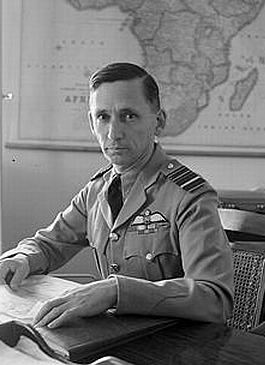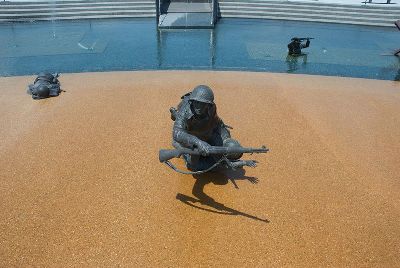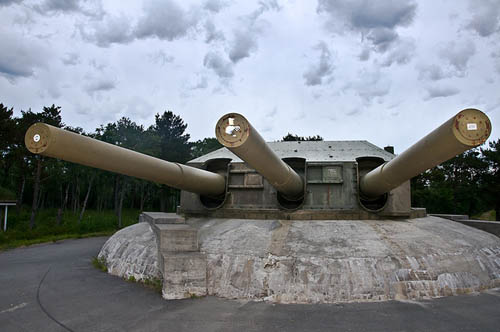Tedder, Arthur William
- Date of birth:
- July 11th, 1890 (Glenguin/Scotland, Great Britain)
- Date of death:
- July 3rd, 1967 (Surrey, Great Britain)
- Nationality:
- British
Biography
Arthur William Tedder was born in Glenguin, Stirling, Scotland to Commissioner of the Board of Customs Sir Arthur John Tedder and Emily Charlotte Bryson. He joined the Dorsetshire Regiment in 1913 and was transferred to the Royal Flying Corps in 1916. During WW1, he served in France between 1915 and 1917 and then in Egypt until 1919. After the war, he was transferred to the newly formed Royal Air Force as a squadron leader. He was promoted to the rank of group captain in 1931, and served as Director of Training from 1934 to 1936. Immediately before the outbreak of the European War, he was the commander of the RAF Eastern Forces and was director general for research in the Air Ministry.
After Britain entered WW2, Tedder served as the head of the RAF Middle East Command, which also covered the battlefields in the Mediterranean Sea and in North Africa. While the forces under his command experienced both victories and defeats, his reputation as an effective air commander grew. He was increasingly known for the deployment of "Tedder Carpet" tactic, which involves multiple bombers committing a rolling barrage with high explosive and napalm bombs ahead of advancing friendly forces. He was knighted in 1942 and was promoted to the rank of air marshal by the end of the Desert War. He was heavily involved in the planning of the invasion of Sicily and then Normandy. He was named Deputy Supreme Commander in the latter campaign, though he at times found himself without resources because commander of the Allied Air Expeditionary Force Trafford Leigh-Mallory at times deployed forces for objectives that were tactically different than that of Tedder's for the campaign in Normandy. In the last year of the war, he was sent to Russia seeking greater coordination between Russia and the Western Allies, particularly during the Ardennes offensive in the winter of 1944 to 1945. In May 1945, he signed the German surrender instrument on behalf of General Dwight Eisenhower.
Tedder lost two family members during the war. His son Richard Tedder died in combat in France during the German invasion. His first wife Rosalinde Maclardy, who was beside him during the Desert War, died in an air crash in Egypt in 1943.
After the war, Tedder gained peerage as First Baron Tedder. He served as the Chief of the Air Staff between 1946 and 1950. In 1950, he served as the British representative on the military committee of North Atlantic Treaty Organization (NATO) in Washington, DC, United States. On the civilian side of his life, he was the chancellor of Cambridge University between 1950 and 1967, served some time on the board of the British Broadcasting Corporation (BBC), and authored his memoirs and a historical study of the Royal Navy.
After several years of struggle with Parkinson's Disease, Tedder passed away in Surrey, England, at the age of 76.
Promotions:
-Army
2nd Lieutenant: September 2nd, 1913
Lieutenant: January 110th, 915
(T) Captain: March 21st, 1916
Captain: June 13th, 1916
(T) Major: January 1st, 1917
- RAF
Major: April 1st, 1918
(T) Lieutenant-Colonel: June 24th, 1918 - April 2nd, 1919
Squadron Leader: August 1st, 1919
Wing Commander: January 1st, 1924
Group Captain: January 1st, 1931
Air Commodore: July 1st, 1934
Air Vice-Marshal: July 1st, 1937
Acting Air Marshal: November 29th. 1940
(T) Air Marshal: June 1st, 1941
Air Marshal: April 14th, 1942
(T) Air Chief Marshal: July 1st, 1942
Air Chief Marshal: June 6th, 1945
Marshal of the RAF: September 12 th, 1945
Do you have more information about this person? Inform us!
- Period:
- First World War (1914-1918)
- Rank:
- Major
- Unit:
- No. 70 Squadron, Royal Flying Corps
- Awarded on:
- May 26th, 1917
- Period:
- Second World War (1939-1945)
- Rank:
- Air Marshal
- Awarded on:
- January 1st, 1942
- Period:
- Second World War (1939-1945)
- Rank:
- Air Marshal
- Awarded on:
- June 30th, 1942
- Period:
- Second World War (1939-1945)
- Rank:
- Air Chief Marshal
- Awarded on:
- November 27th, 1942
- Period:
- Second World War (1939-1945)
- Rank:
- Air Chief Marshal
- Awarded on:
- 1942
- Period:
- Second World War (1939-1945)
- Awarded on:
- August 27th, 1943
- Period:
- Second World War (1939-1945)
- Rank:
- Air Chief Marshal
- Awarded on:
- August 27th, 1943
- Period:
- Second World War (1939-1945)
- Rank:
- Air Chief Marshal
- Awarded on:
- August 27th, 1943
- Period:
- Second World War (1939-1945)
- Rank:
- Air Chief Marshal
- Awarded on:
- October 1st, 1943
- Period:
- Second World War (1939-1945)
- Rank:
- Air Chief Marshal
- Awarded on:
- August 28th, 1945
- Period:
- Second World War (1939-1945)
- Rank:
- Air Chief Marshal
- Awarded on:
- 1945
- Period:
- Second World War (1939-1945)
- Rank:
- Marshal of The RAF
- Awarded on:
- June 14th, 1946
- Period:
- Second World War (1939-1945)
- Rank:
- Marshal of The RAF
- Awarded on:
- June 18th, 1946
- Period:
- Second World War (1939-1945)
- Rank:
- Marshal of The RAF
- Awarded on:
- June 18th, 1946
- Period:
- Second World War (1939-1945)
- Rank:
- Marshal of The RAF
- Awarded on:
- September 6th, 1946
- Period:
- Second World War (1939-1945)
- Rank:
- Marshal of The RAF
- Awarded on:
- September 27th, 1946
- Period:
- Second World War (1939-1945)
- Rank:
- Marshal of The RAF
- Awarded on:
- October 31st, 1947
- Period:
- First World War (1914-1918)
- Period:
- First World War (1914-1918)
- Period:
- First World War (1914-1918)
War Diary mentions
8 November 1944 WO 171/691 - 159 Infantry Brigade
At 0830 hrs 1 Hereford took over from 4 Ksli in IJSSELSTEIN, the 4 Ksli moving to DEURNE Bks for a 48 hrs rest in preparation for taking over GRIENDTSVEEN. Other Bde locations remained the same. Patrols continued during the night. Air Marshal Tedder and General Dempsey visited the Hq and remained talking to the Brigadier for about half an hour.
Sources
- Photo 1: Wikipedia.org
- - Supplement to The London Gazette Issue 35399 published on the 30 December 1941
- Third Supplement to The London Gazette Issue 35801 published on the 24 November 1942
- Third Supplement to The London Gazette Issue 36192 published on the 28 September 1943
- Fourth Supplement to The London Gazette Issue 37242 published on the 24 August 1945
- Fourth Supplement to The London Gazette Issue 37610 published on the 11 June 1946
- Second Supplement to The London Gazette Issue 37614 published on the 14 June 1946
- The London Gazette Issue 38113 published on the 31 October 1947
- Air of Authority - A History of RAF Organisation
- https://www.thegazette.co.uk/London/issue/30096/supplement/5201


























